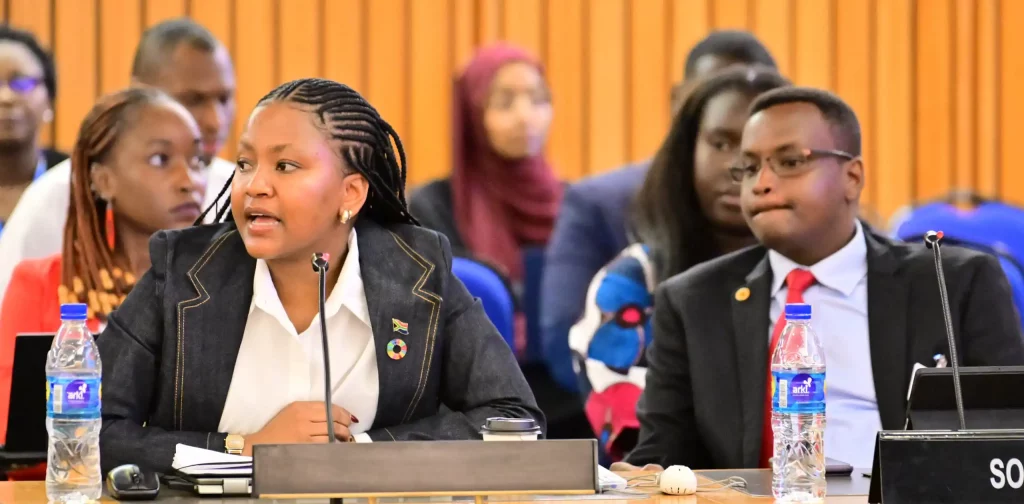Amplifying African Youth Voices in the Consultative Forum

African Youth Consultative Forum on UN Summit of the Future 2024 on UNECA
Youth shapes our future. At the same time, the current security, climate, and economic challenges affect how young people access basic needs to prepare for the future. Therefore, it is important to see these challenges through their lenses. Creating space for youth to voice their opinions and propose ideas for addressing regional issues and finding solutions becomes essential. In Addis Ababa, African youth came together to amplify their voices in addressing Africa’s biggest challenges to steer the future UN Summit.
Challenges Faced by African Youth
Africa, the second-largest continent on Earth, is experiencing a significant increase in its youth population. With approximately 60% of its inhabitants under the age of 25, Africa is projected to maintain the world’s youngest population by 2100. Despite this demographic advantage, African youth continue to encounter numerous challenges, ranging from inadequate education to high levels of unemployment.
In 2023, the region’s average youth unemployment rate surpassed 20%, which was double the global average. The rate varied across countries, with some reporting rates exceeding 40–50%, remaining stable since 2021.
Moreover, more than 72 million young Africans are not engaged in education, employment, or training (NEET), with two-thirds of them being young women. Sub-Saharan Africa registers the highest rate of education exclusion in the developing world, with nearly 60% of youth aged 15 to 17 out of school.
The African Youth Consultative Forum
The African Youth Consultative Forum for the UN Summit of the Future is a key component of the UNDP’s side event, held alongside the Africa Regional Forum on Sustainable Development (ARFSD) 2024.
Taking place in Addis Ababa, Ethiopia, on April 26-27, 2024, the forum had three primary objectives: to provide a platform for intergenerational engagement, amplify young leaders voices in policy formulation, and discuss the realization of youth-specific issues outlined in the zero draft of the Pact for the Future in Africa.
The forum explored five key areas: sustainable development and financing; peace and security; science, technology, innovation, and digital cooperation; youth and future generations; and transforming global governance.
Besides African youth, experts from various fields participated in the event. Participants engaged in presentations, conversations, and intergenerational discussions, leading to the creation of an Africa Youth position paper by the end of the forum.
Multilateral Cooperation for the Future
Addressing global challenges and supporting youth requires essential multilateral cooperation. It is crucial to establish safe spaces for youth engagement, highlighting the important role of a strong multilateral system and cooperation in protecting human rights and promoting inclusivity.
“We need more than ever your voices in this process; we need your voice addressing your governments so that the positions governments take in the Summit of the Future represent the voices of the young people at the country level,” said Felipe Paullier, the UN Assistant Secretary-General of Youth Affairs.
Nevertheless, given the apparent decline of democracy in global affairs, focusing on institutional reform, protecting freedom of speech, and upholding democratic principles seem prudent. These steps are necessary to encourage civic engagement and effectively tackle the complex issues faced in Africa and globally.
Editor: Nazalea Kusuma

Subscribe to Green Network Asia
Strengthen your personal and professional development with cross-sectoral insights on sustainability-related issues and sustainable development across the Asia Pacific and beyond.


 How Plant the Emirates Aims to Support Food Self-Sufficiency in the UAE
How Plant the Emirates Aims to Support Food Self-Sufficiency in the UAE  GRI’s Updated Sustainability Standards on Climate Change and Energy
GRI’s Updated Sustainability Standards on Climate Change and Energy  Looking into Biochar as a Bioremediation Agent
Looking into Biochar as a Bioremediation Agent  Australian Climate Visa for Citizens of Tuvalu: Showcasing cross-border partnership in light of the climate crisis
Australian Climate Visa for Citizens of Tuvalu: Showcasing cross-border partnership in light of the climate crisis  Nickel Mining in Raja Ampat and the Widespread Cost of Natural Resource Exploitation
Nickel Mining in Raja Ampat and the Widespread Cost of Natural Resource Exploitation  Lumbung Sosial: Challenges and Opportunities of Indonesia’s Social Barn Program
Lumbung Sosial: Challenges and Opportunities of Indonesia’s Social Barn Program